Below is a recent DKU news article about the HRC: https://news.dukekunshan.edu.cn/campus-news/like-fuel-to-a-fire-dku-hub-lights-research-passion-in-students/
As one of the powerhouses of DKU research, the Humanities Research Center involves students in groundbreaking projects and nurtures their academic curiosity. In the second of a series on student-led research, we examine some of the projects pursued under the HRC banner, as well as the center’s broader culture.
Like many good ideas at Duke Kunshan University, it started with a message in a WeChat group.
Reika Shimomura was asking if any fellow undergraduates wanted to submit a research grant proposal to the Humanities Research Center, one of several hubs driving interdisciplinary exploration at the university in Jiangsu province, China.
Within two years of Erin Greig answering that call — and countless hours of hard work later — the global health majors had become first-authors of published research and were preparing to present their findings on COVID-19 policy to an international conference.
That research opportunity through the HRC’s Health Humanities Lab encapsulates one of the center’s key philosophies: the championing of impactful research for the wider good and the advancement of those undertaking it.
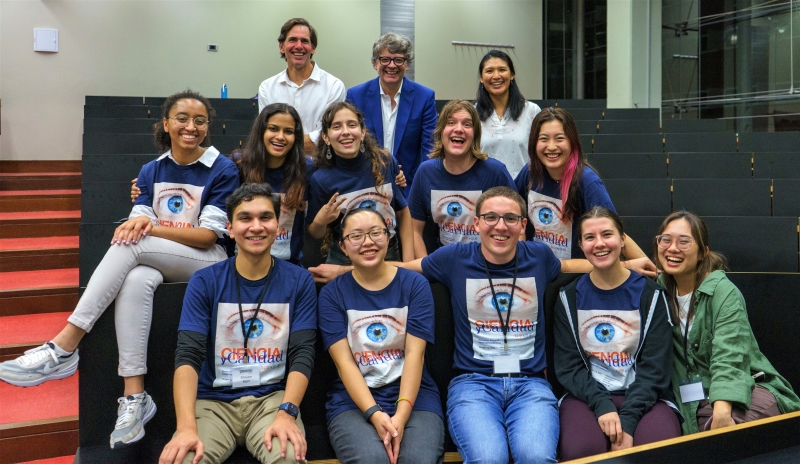
“We aim to be creative, challenging, innovative, and unrestrained by conventions and boundaries,” said Dr. James Miller, co-director of the HRC and Duke Kunshan’s inaugural professor of humanities.
“The HRC is not focused on immediate concrete outcomes, but rather investing for the long term in our faculty and students. I think we will be able to tell in about 10-15 years if we have been successful.”
Established in 2017 to promote research and creative expression in the arts and humanities, the center brings faculty and students from diverse disciplines such as data science, global health, anthropology and neuroscience into its sphere of humanistic inquiry.
The engine rooms of the HRC’s scholarly output are its laboratories, which facilitate collaboration and networking through talks, seminars, workshops and other events, alongside their main focus of promoting and funding research.
The labs — Anthropocene XR, CARE, Citizenship, Doc, Freedom, Health Humanities and Third Space — offer students routes into high-level research with faculty who are experts in their field.
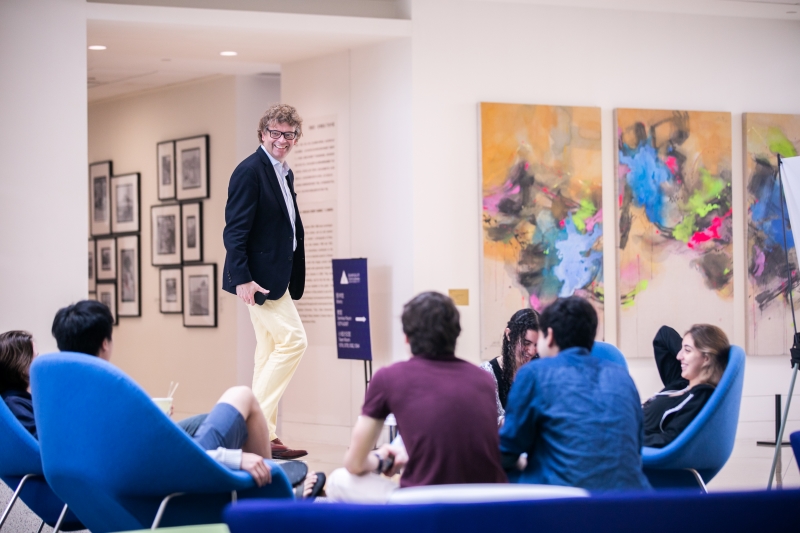
“Research is not just about discovering new ideas or theories but about developing skills that make you into a better learner,” Miller said.
“At DKU research is a core element of the learning experience.
“While most universities traditionally confine research to graduate programs, in the humanities at DKU we institute research-based or inquiry-based learning from the beginning of the curriculum.”
Read below about some of the student-led research undertaken at the HRC:
From WeChat to WePublish: undergrads become first-authors
After connecting on WeChat, China’s ubiquitous messaging app, and having secured the backing of the HRC, Shimomura and Greig were left pondering how exactly they would approach the daunting task ahead of them.
At that stage, the global health (biology track) students had only a relatively vague plan to look at government responses to COVID-19.
Driven by their realization that the pandemic, “while heartbreaking to watch unfold, was an opportunity to learn”, they first dived into reviewing existing literature in areas such as the bioethics of infectious disease control.
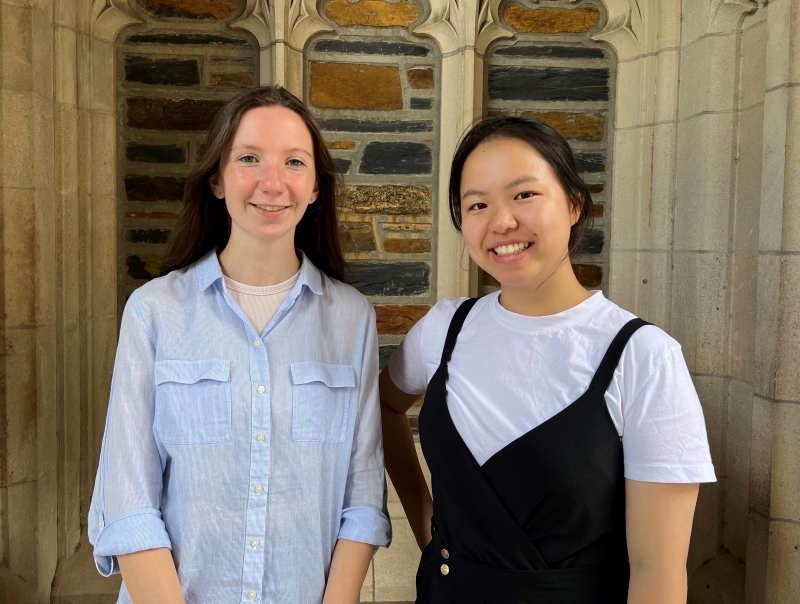
Following regular meetings with their mentors, Assistant Professor of Philosophy Dr. Daniel Weissglass and Assistant Professor of Health Policy Dr. Meifang Chen, they decided to hone in on digital contact-tracing.
Confronted with myriad challenges such as the lure of tangent lines of inquiry and the formidable workload of an extra-curricular project of ever-increasing complexity, the ensuing success of their study into contact-tracing apps introduced for the COVID-19 crisis was a welcome surprise for the Class of 2023 students.
Furthermore, the publication of “An evaluation of privacy policies used in digital contact tracing apps for COVID-19” in the Journal of Public Health and Emergency demonstrated the possibilities for DKU students to make significant contributions to academia and public understanding of seismic global events, even as undergraduates.
The paper evaluates the privacy policies of contact-tracing applications against World Health Organization guidelines and makes recommendations for following good ethical practices.
“Growing up, people told us not to be too disappointed if we didn’t get to publish as undergraduates,” the classmates said.
“Now, having our first published paper, an undergraduate-run project co-written by both of us, it’s definitely fuel to a fire. We want to do more of this exploration.”
How their paper was presented in the JPHE:

For her Signature Work research project, Shimomura is staying with the COVID-19 theme to look at pandemic-related policies on the DKU campus, while Greig is focusing on the impact of Alzheimer’s disease on women in the 1980s.
After graduating, Greig, from Edinburgh, Scotland, a recipient of the Guo Tingting Scholarship, plans to pursue an M.D.-Ph.D., which offers more research opportunities than the typical medical school experience.
Shimomura, who is from Pittsburgh, Pennsylvania, in the U.S. but mainly grew up in the Kansai region of Japan, is keen to launch her career with a view to further exploring the intersection between technology and public health.
Chen said, “Reika and Erin’s success is an excellent example of DKU creating an environment for our next generation of independent researchers who are caring and responsive global citizens, curious and passionate in seeking innovative, interdisciplinary solutions to tackle pressing global issues, and applying in-class learning to real world problem-solving through enhancing their research skills and capacity.”
Ankle-deep in mud: ‘My high school classmates aren’t doing this!’
Could the sustainability practices of Yue Feng Island Organic Farm in Kunshan provide a template for how to prevent a looming environmental disaster?
Yufan Gao thinks so. She is combining her interest in the environment and film-making to shoot a documentary on the farm.
Gao believes the techniques employed there offer inspiration for addressing the lack of seed diversity in China and elsewhere, a stark environmental issue threatening food security.
She is exploring the efforts of the farmers to expand local seed stocks through the preservation of ancient varieties and using them to plant crops year after year.
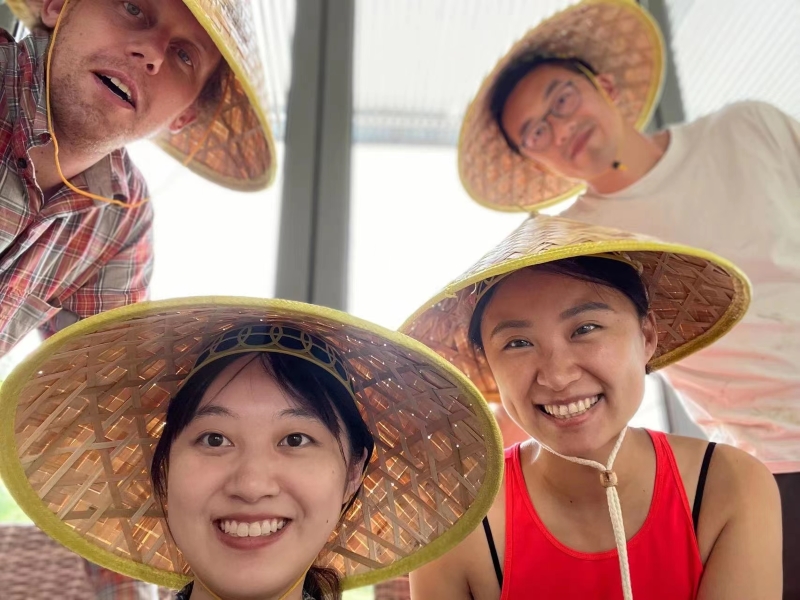
Their aim is to counter the reliance on bulk-bought seeds, often from abroad.
Through commercialization and the favoring of high-yield and more efficient varieties, that reliance has reduced levels of biodiversity, a mitigating force against the risks to food supply of crop disease and climate change.
“I want to focus on how these farmers incorporate this idea of sustainability into their production and operations,” said Gao, who majors in environmental science (biogeochemistry track).
“My idea is to record their research into seed diversity and find out what difficulties they have encountered, how they solve them and what this could lead to for China’s agriculture. I think there could be a blueprint here.”
As a Kunshan native, Gao has already attained special insight into both the farm’s operations and its local culture, and hopes to learn more about the connection between traditional farming culture and the Kunshan dialect.
She said there were challenges with spending so much time in rice fields filming the farmers and learning from them during one of the hottest summers in years.
“I walk into the field every time with the farmers, it’s really weird to take off your shoes and stand there in the mud,” said the Class of 2024 student, who was awarded a Green Future Fund scholarship.
“But I think this really is the highlight of the DKU experience. My high school classmates don’t have the same kind of experience in their college.”
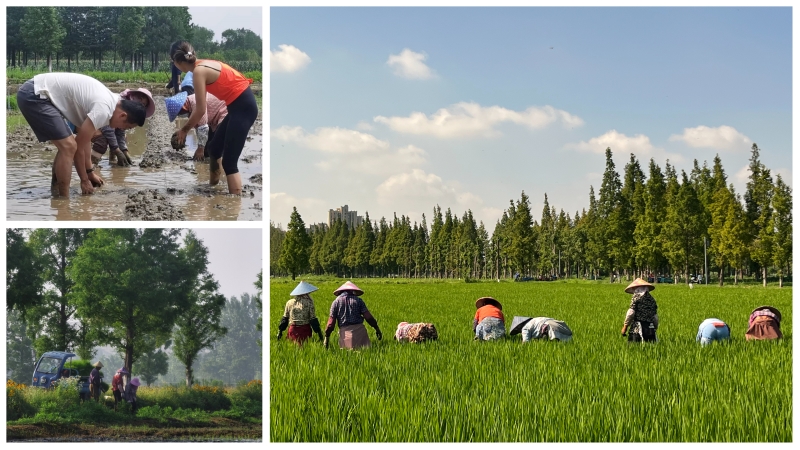
The project under the HRC’s Doc Lab is overseen by Chuanhui Gu, associate professor of environmental science, and Kaley Clements, assistant professor of media and arts.
Clements said, “Learning should extend beyond the campus setting. We want our students to get out there to interact with the world and develop observational skills. We can learn from everyone we meet.”
Peasant paintings: The thrill of ‘touching history’
Art history major Zheng Zou gets a buzz from tapping into the past to uncover what was really going on at the time.
His research into Chinese peasant paintings during the late 1950s to the 1970s takes a fresh look at the motivation of the artists and the inspiration for their work.
Keen to immerse himself in the mindset of the painters, Zou traveled to one of the movement’s heartlands, Hu county, Shaanxi province, where he trawled through the archives of accounts given by the artists themselves.
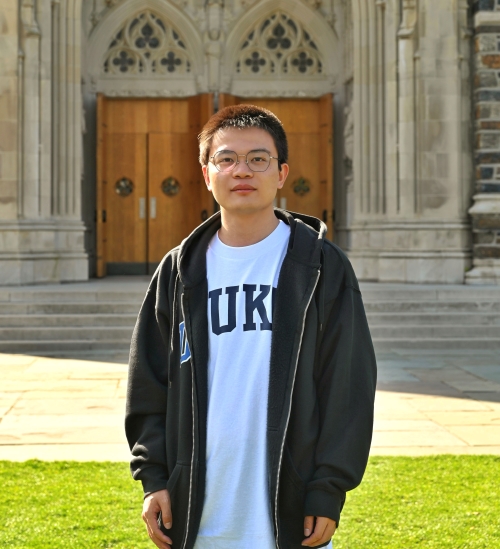
He was also able to get a sense of the era by visiting the very scenes that the artists had painted decades earlier.
“For me it’s like going back in history,” said Zou, who is in the Class of 2023.
“I saw where these peasants lived, I got to see the scenes of their paintings and I went to the archive to look at the primary sources.
“I’m really thrilled when I can touch history, when I can get back into that context to see the history for myself.”
The Chinese government launched the peasant paintings art movement in the late 1950s as part of its rallying of rural communities behind the new People’s Republic of China.
It represented the first engagement of Chinese peasants in official art creation, a role previously reserved for the intellectual class.
Zou’s research — “The Forgotten Romance: An Art and Social History Study on Chinese Peasant Painting of 1950-70s” — made two key findings.
Firstly, government encouragement was not the only reason for peasants deciding to engage in the art movement. Zou said they also had an “intrinsic motivation” to paint for personal fulfillment.
Secondly, rather than having a standalone style, the works shared many characteristics with traditional Chinese paintings.
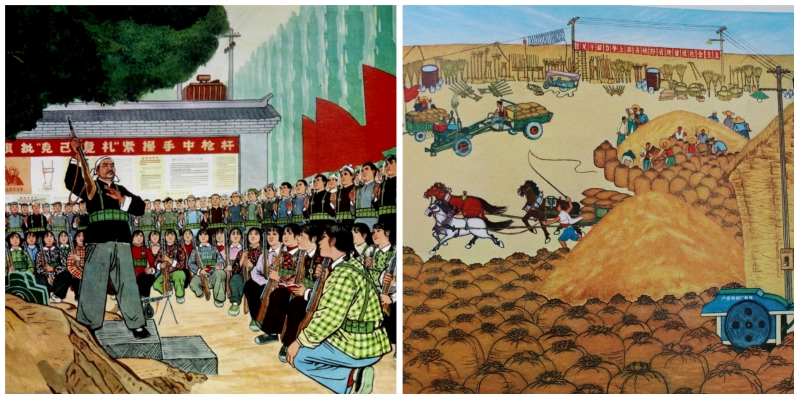
There were usually two stages to the painting process, the research also highlighted.
The peasants initially focused on capturing scenes typical of their daily life before making adaptations based on advice from figures of authority on how to politicize the painting.
Zou, who is from Suzhou, is doing the study as part of his Signature Work, a compulsory element of DKU’s four-year undergraduate degree requiring students to research a topic of their choosing.
He said he was excited to “reconstruct the real historical context” of the art movement and to bring the peasants’ stories “back to life”. After graduating from DKU, he wants to pursue further study in ancient Chinese art.
Dr. Qian Zhu, assistant professor in humanities (history), is supporting Zou as he completes the study.
“Zheng’s research across social history, Chinese politics, cultural studies and art is an exemplar of the DKU interdisciplinary education, which has prepared him well to advance the research in graduate school,” she said.
A meeting of minds in Barcelona
The above projects were among those pursued under the HRC banner and presented to the center’s fall conference this year, a gathering in Barcelona, Spain, of leading and emerging arts and humanities scholars.
Titled “Ciencia y Caridad” in honor of the Pablo Picasso painting, the conference heard talks on the artist’s legacy as well as the politics of environmental crisis, societal and technological developments in China and other global topics.
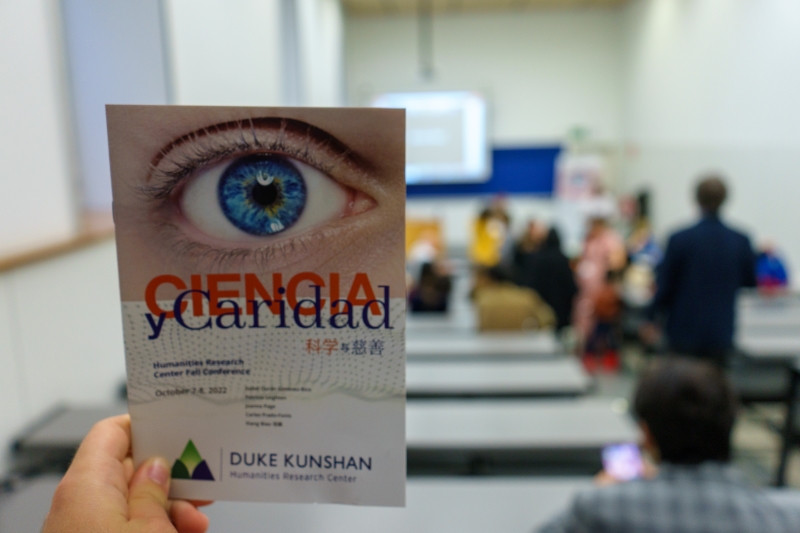
“This two-day event brought together around 80 participants, four keynote speakers and a distinguished guest lecturer in order to shed light on global responses to various challenges, using China and Spain as contexts of scientific development and empathy to bring communities together,” the Class of 2026’s Mateja Bokan wrote in his conference report.
Creative expression is also central to the research center’s activities.
The HRC has established a number of artistic and literary partnerships, such as with the Shanghai Literary Review and Chronus Arts Center, leading to an artist residency program at DKU overseen by Dr. Zairong Xiang, an assistant professor of comparative literature and the university’s associate director of arts.
The residency spawned the Beauty Salon project, a temporary living room in the name of art designed to transcend social circles and provoke new thinking about interaction.
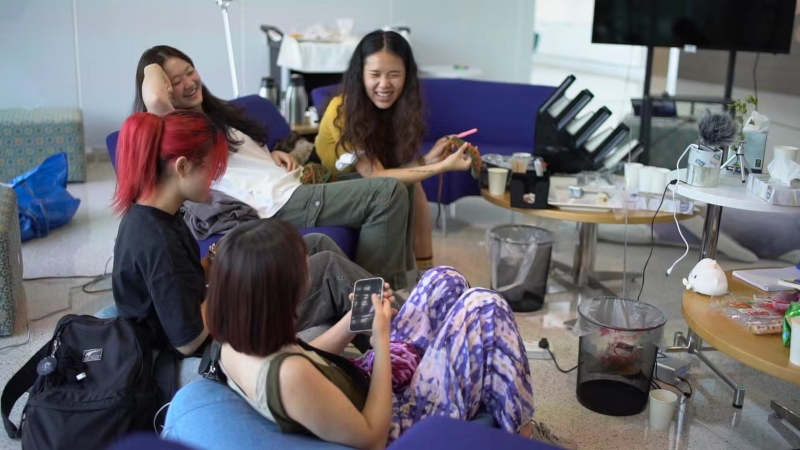
Its second installment, run on campus over three days in September and led by the _ao_ao_ing artist collective, encouraged all-comers to share a space and engage in various forms of discussion and creativity, from guitar-playing, knitting and chatting to debating and exhibiting art.
“This is an alternative space for those who create,” said the collective, with the salon becoming a feature of the campus.
“The vitality of any space needs thinkers and doers, and everyone in this school has the potential to change the implicit rules of the space.”
What does it mean to be truly significant?
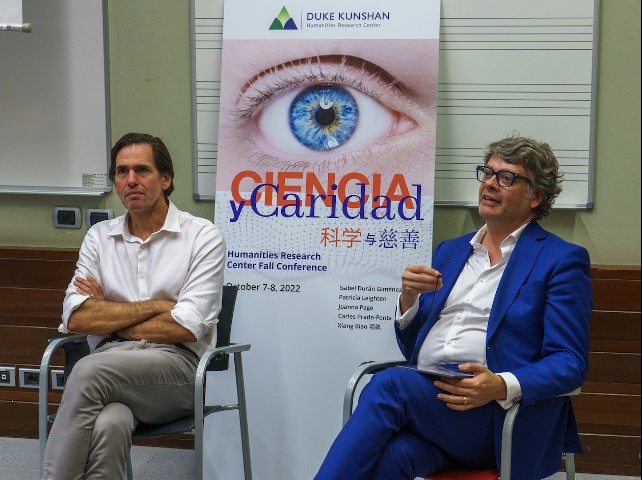
The HRC, which draws most of its funding from a Duke University provost’s fund, encourages research collaborations between DKU and Duke and its advisory board consists of faculty from both institutions.
In particular, the center has benefited from its close relationship with Duke’s Franklin Humanities Institute and its director Dr. Ranjana Khanna, a professor of English, literature, and women’s studies.
HRC co-director Dr. Carlos Rojas, a professor of Asian and Middle Eastern studies at Duke, said the center is rooted in a global mindset.
“DKU is itself an international university, and the HRC views transnational collaborations as a central element of its mission,” he said.
“Given DKU’s location in Kunshan and its ties to Duke, the center is well-positioned to develop productive relationships not only with other institutions in China and East Asia, but also with institutions in North America. In addition, the center also has close connections with numerous scholars and universities in Europe.”
By working on high-level research with talented faculty from across the globe, Dr. Miller said, students acquire a range of new skills and a deeper appreciation of the world around them.
“They learn to distinguish good ideas from bad ideas and strong arguments from weak arguments,” he said.
“They learn how to communicate complex ideas to their peers. They learn how to be persuasive, and at the same time more thoughtful and caring of others.
“And when students learn from the classics they learn to see what has the capacity to last beyond a single lifetime or stretch beyond a single culture.
“Really they are learning what it means to be truly significant.”
- Stay informed of HRC activities via its website and social media channels.
- Read our story looking at DKU-wide research opportunities for students.
- Learn about the Class of 2022’s Signature Work projects here.
- For more research news, visit the dedicated section of our website.